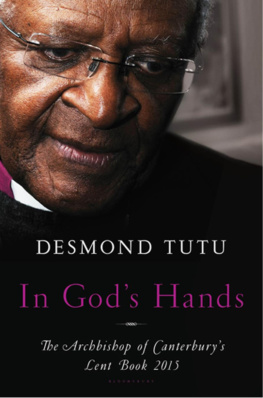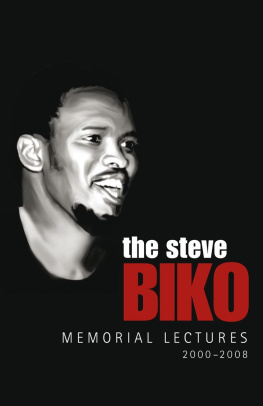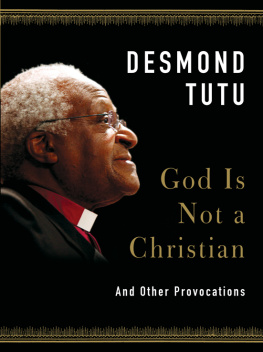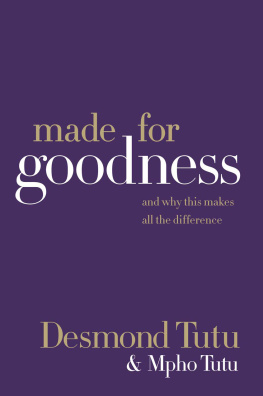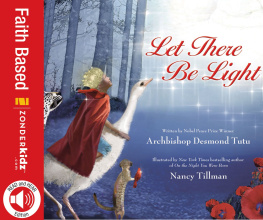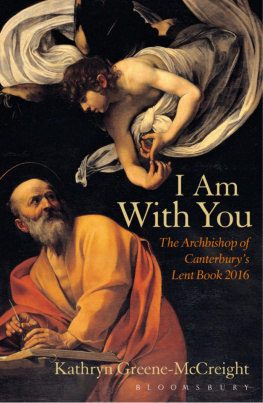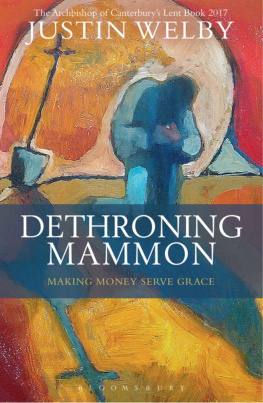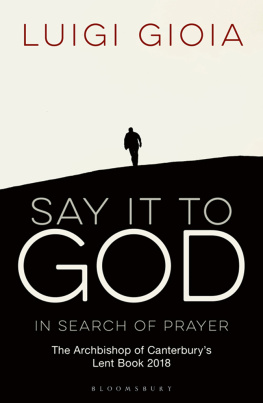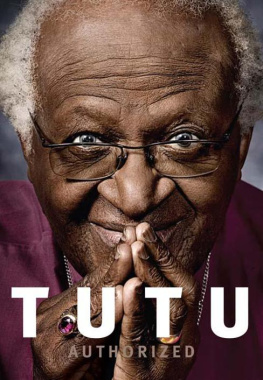IN GODS HANDS
IN GODS HANDS
THE ARCHBISHOP OF
CANTERBURYS LENT BOOK 2015
DESMOND TUTU
CONTENTS

FOREWORD
This is a very unusual Archbishops Lent Book. It is written by one of the most extraordinary Christian leaders alive today, or to have lived in the last century or more. Archbishop Desmond Tutu was a crucial figure in the overthrow of a regime of the utmost evil. More than that, he led the way forward into a society that was seeking reconciliation without revenge. He has remained fearless in his public comments, always constant to principle, and never resting on his laurels.
The results of his work, and the work of those alongside whom he struggled, are not complete. Human fallibility means they never can be. Yet a country is emerging whose potential is internationally recognized, and whose hope is in significant part the result of Archs contribution.
It is easy to see such figures in news reports, to hear their words and wonder what drives them. In this book we see the love for Christ, the generosity of spirit, the immense vision and courage, and the extraordinary virtues which have set the course of Archs life to date. Just as an x-ray reveals the spine, so here Arch explains his essence, that we may glimpse the framework that has steeled and stayed him through turbulence and trauma. The vision that has emerged out of the profound struggles of his life is one that calls all people to share his hope, regardless of where they come from or what they experience. It is a global vision for a divided and cruel world.
He has written a Lent book in which his own, very distinctive voice is heard clearly. We are drawn in to his story through testimony and narrative; we are drawn in to reflection through comment and humour and passionate declamation. This is a book of transparency about its author. We live the life alongside the author; and the voice we hear, even if we might disagree with some of what he says, challenges us to hear the voice of Christ.
It is hearing through the voice of Arch the voice of Christ that gives this Lent book its unique quality and makes it so appropriate. Even for those who already take Lent very seriously, Lent books can become a discipline of some rigour. That is perfectly proper, of course. But beware this book, which may appear deceptively simple until we allow it to draw us into the great struggle for justice, and become whirled along in the slipstream. As Karl Barth urged, the Christian should have the Bible in one hand and the newspaper in the other (and, as he continued, interpret the newspaper from the Bible, not the other way around). Desmond Tutu compels reflection on both, yet demands continually that we return to the scriptures for the way in which we see the world. Having engaged with the world in all its injustice and struggle we are fuelled afresh for the journey with Jesus, not least to the great events of Holy Week and Easter.
In times of conflict we are tempted to react instinctively rather than in obedience to Christ. This book is different, demanding and dramatic because it holds us to his call. You will not look back.
+ Justin Cantuar
Lambeth Palace
Feast Day of St Bartholomew the Apostle,
24 August 2014
I must tell you this old story which you probably know. Sometimes it was related by Blacks when they considered their plight as victims of the injustice and inequity of racism. Long ago, when the missionaries first came to Africa, we had the land and they had the Bible, and they said, Let us pray. We dutifully closed our eyes, and at the end they said, Amen, and when we opened our eyes Why! the Whites had the land and we had the Bible.
This is not being fair to the missionaries. They may sometimes have been the vanguard preparing the way for their colonising compatriots, but I want to pay a very warm tribute to most of these Western missionaries. Most of us in the Black community owe our education to those indomitable Europeans who built outstanding educational institutions such as Lovedale, Healdtown, and the University of Fort Hare in the eastern Cape, which served not only South Africa but other countries of the African continent, whose citizens graduated from what was one of the few institutions providing university training for Blacks. Nelson Mandela received nearly all his education in one or other of those institutions.
Many of us would have succumbed to the diseases prevalent in poor and unlettered homes had it not been for the clinics and hospitals that the missionaries erected. It would be to malign some of the most dedicated and selfless human beings that ever walked Gods earth. Is the outrage that the story evokes justifiable? Is it the case that what the story tells would have been a bad bargain, losing ones land and all that goes with it in exchange for what? The Bible. Would it have been the case that the missionaries had pulled a fast one over the gullible Blacks? I want to assert as eloquently and as unequivocally as I can that it was not so. We Blacks had in fact not struck a bad bargain. The missionaries placed in the hands of Blacks something that was thoroughly subversive of injustice and oppression.
Before I go on to show how subversive the Bible is of injustice and oppression, may I digress a little? It will be a digression that enhances the wonder of the biblical assertions regarding us human beings. Like the Hebrews, other nations had their own myths; these stories about the beginning times. One of the more well-known is the Babylonian story of the beginning times, Enuma Elish, in which Marduk, after defeating the dragon goddess, Tiamat, reigns supreme.
Two important points emerge that distinguish the biblical account from that of the other peoples such as the Babylonians. In the Babylonian epic, the human being is created in part from the dismembered carcass of Tiamat, the defeated goddess of chaos, so he already has as a constituent part of his makeup something evil from the portion of Tiamats carcass out of which he is created. More importantly, human beings are created to do all the backbreaking work, to slave so that the gods can have fun and enjoy themselves. It would thus not be surprising for such human creatures to behave badly. They were in a sense programmed to go astray, because of the evil element in their constitution.
The biblical narrative is majestic in its beauty. God is one although in the Hebrew Bible Gods name is a plural form, Elohim , the biblical God is transcendentally one; there is no battle of the gods. There is no struggle out of which creation emerges. No, God the God of the Bible has but to speak and this creative fiat brings all into being in an orderly fashion. Perhaps using the plural form was the Bibles way of claiming for this one God all the divine power which, in religions like that of the Babylonians, required many gods. God has but to speak: Let there be and there is.
And, crucially, what comes into existence comes each in its order: the heavens, the separation of the waters to bring the rest of Gods creation into being (since the firmament separated the waters above the firmament from those under the firmament), etc. The heavenly bodies, the sun, the moon and the stars are not there to be worshipped or to be feared as having a baneful influence on the fate of humans. You know how, even today, we speak of thanking our lucky stars, and many magazines and newspapers run columns about horoscopes and what the stars foretell. It is amazing just how many us of still think that these celestial bodies can influence our fate for good or ill. The biblical account puts them, as it were, properly in their place. They are not gods; no, they are there to serve humankind, to give light by day or by night.

